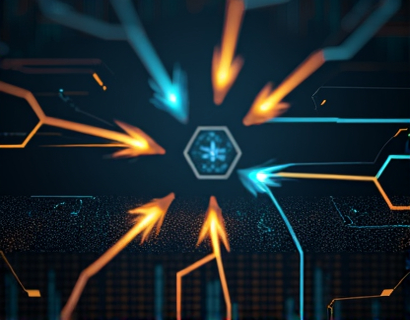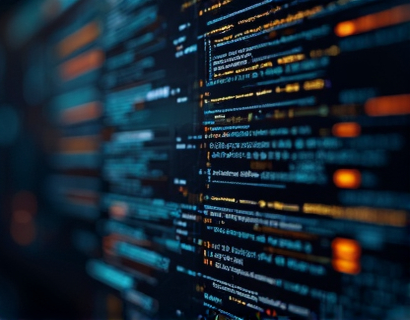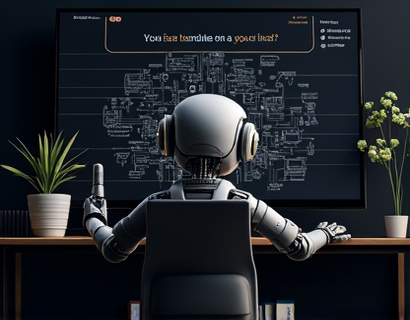AI and Crypto: Pioneering the Future of Fintech with Intelligent Solutions
The intersection of artificial intelligence (AI) and cryptocurrency is giving birth to a new era in financial technology (FinTech). This convergence is not just a trend but a transformative shift that promises to redefine the landscape of banking and financial services. The integration of AI into the crypto ecosystem is creating intelligent solutions that offer a more efficient, secure, and personalized experience for tech and finance innovators. This article delves into the ways AI and crypto are collaborating to shape the future of FinTech, exploring the benefits, challenges, and potential of this powerful combination.
Enhancing Efficiency through AI in Crypto
One of the most significant impacts of AI in the crypto space is the enhancement of operational efficiency. Traditional financial systems are often bogged down by manual processes and slow transaction times. AI-driven solutions can automate these processes, reducing the time and cost associated with transactions. For instance, AI algorithms can quickly verify transactions, detect fraud, and manage risk, thereby streamlining operations and making them more efficient. This efficiency is crucial for the growth of crypto as a viable alternative to traditional financial systems.
Moreover, AI can optimize trading strategies in cryptocurrency markets. By analyzing vast amounts of data in real-time, AI can identify patterns and trends that human traders might miss. This capability allows for more informed decision-making, potentially leading to higher returns on investment. Smart contracts, another AI-driven innovation, automate the execution of contracts when predefined conditions are met, further reducing the need for intermediaries and speeding up processes.
Security Enhancements with AI
Security is a paramount concern in the crypto world, and AI is playing a pivotal role in addressing these challenges. Traditional security measures often struggle to keep up with the sophistication of cyber threats. AI, however, can adapt and learn from new threats, providing a more robust defense mechanism. Machine learning algorithms can detect anomalies in transaction patterns, flagging potential fraudulent activities before they cause significant damage. This proactive approach to security is essential for building trust in the crypto ecosystem.
Additionally, AI can enhance the security of blockchain itself. By monitoring the network for unusual activity, AI can help prevent attacks such as 51% attacks or double-spending. The use of AI in cryptography also strengthens the encryption of digital assets, making them more secure against hacking attempts. As the value of crypto assets continues to rise, the importance of robust security measures cannot be overstated, and AI is proving to be a valuable ally in this regard.
Personalization in Financial Services
The personalized experience offered by AI in FinTech is a game-changer. In the traditional banking system, services are often one-size-fits-all, failing to meet the unique needs of individual users. AI-driven platforms can analyze user data to provide tailored financial advice, investment strategies, and product recommendations. This level of personalization not only enhances user satisfaction but also increases the effectiveness of financial services.
For crypto users, AI can help manage complex portfolios by suggesting optimal asset allocations based on individual risk tolerance and financial goals. Personalized alerts and notifications can keep users informed about market movements and transaction statuses, ensuring they stay in control of their financial affairs. This personalized approach is particularly valuable in the volatile crypto market, where timely and relevant information can make a significant difference.
Challenges and Considerations
While the integration of AI and crypto offers numerous benefits, it also presents several challenges. One of the primary concerns is the regulatory landscape. The crypto space is still largely unregulated, and the introduction of AI-driven solutions adds another layer of complexity. Regulators must balance the need for innovation with the protection of consumers and the stability of financial systems. Clear and consistent regulations are essential to foster trust and ensure the responsible development of AI in FinTech.
Another challenge is the technical expertise required to develop and maintain AI systems. Not all players in the crypto space have the resources or knowledge to implement these advanced technologies effectively. This could lead to a divide between well-resourced entities and smaller players, potentially stifling innovation. Collaboration and knowledge sharing within the community can help bridge this gap and promote broader adoption of AI in crypto.
The Role of AI in Decentralization
Decentralization is a core principle of blockchain technology, and AI can both support and challenge this concept. On one hand, AI can enhance the decentralized nature of crypto by improving the efficiency and reliability of decentralized applications (dApps). AI-driven dApps can offer more sophisticated functionalities while maintaining the decentralized ethos of the blockchain. For example, AI can optimize decentralized exchanges (DEXs) by matching buyers and sellers more efficiently, reducing slippage and improving liquidity.
On the other hand, the centralization of AI resources poses a risk to the decentralized ideals of crypto. Large tech companies with significant resources can dominate the AI landscape, potentially creating monopolies and undermining the democratic nature of blockchain. To mitigate this, the crypto community must advocate for open-source AI solutions and decentralized AI platforms that distribute power and control more evenly.
Future Prospects and Innovations
The future of AI and crypto in FinTech is bright, with numerous innovations on the horizon. One exciting area is the development of AI-powered digital assets. These assets can leverage AI to adapt to market conditions, offering dynamic value propositions. For instance, AI-driven tokens could adjust their utility or scarcity based on user demand and market trends, creating more engaging and responsive financial instruments.
Another promising development is the integration of AI with other emerging technologies such as the Internet of Things (IoT) and 5G networks. This convergence can lead to the creation of smart financial ecosystems where devices and systems interact seamlessly, providing real-time data and insights. Such ecosystems can revolutionize areas like supply chain finance, insurance, and lending, making them more efficient and transparent.
Furthermore, AI can play a crucial role in democratizing access to financial services. In regions with limited banking infrastructure, AI-driven crypto solutions can provide financial inclusion by offering access to banking services through mobile devices. This can empower underserved populations and drive economic growth in these areas.
Conclusion
The synergy between AI and crypto is poised to transform the FinTech industry, offering a future that is more efficient, secure, and personalized. While challenges exist, the potential benefits are substantial, and the ongoing innovation in this space is likely to yield groundbreaking solutions. As tech and finance innovators continue to explore the possibilities of AI and crypto, the landscape of financial services will continue to evolve, paving the way for a more inclusive and advanced financial world.










































